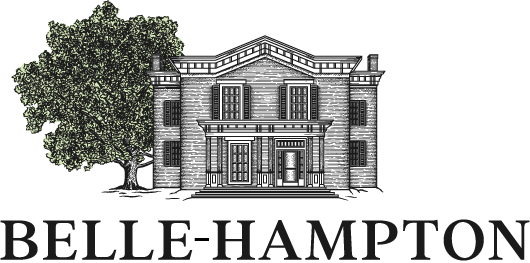Witness Tree Legacy: Establishing a 250-year Plan
Belle Hampton’s Black Walnut Witness Tree
Those majestic trees that have been around for 140-160 years during historical events are called "witness trees." To qualify for the official naming and protection, they must be on former battlegrounds. Although there may have been family "battles" on our property, Belle-Hampton, we have a black walnut tree estimated to be about 200 years old. It had witnessed family events since 1826, when the Main House was first established. As owners, we are the 7th generation raising cattle on the property. The tree has seen the earlier proprietors' births, weddings, and deaths—all of the family celebrations and the workings of the family business. As we construct our 250-year plan, we first look to the witness tree for perspective.
What can we learn from the past? Because history gives us the tools to analyze and explain problems in the past, it positions us to see patterns that might otherwise be invisible in the present. The key word here is patterns. If you study economics, they have predictable cycles of ups and downs. The latest prediction is for another Great Depression, 100 years after the last one, in 2030. But let's focus on what is in our control.
Since we have such an established history, just a little research can demonstrate the shirt sleeve to shirt sleeve cycle of family businesses. General James Hoge, the initial builder of the home, was a successful entrepreneur. He raised cattle and hemp, used for rope a the time. His sons prospered and built their own thriving businesses in various industries. His grandson, who inherited the property, expanded on his grandfather's success by starting a coal mine and development business while raising prized cattle. The next generation, however, used the place as a summer camp. Although they had local workers farm the property, it was not their primary focus. That generation used the farm's resources instead of growing and developing them. I understand that it gave the subsequent generations lifelong skills and meaningful memories, but the business acumen of being stewards of the property was not their focus.
As a result, the farm was two weeks from being sold outside of the family to make ends meet. For some reason unknown to us, the family wasn't investing in the property. The neglect and wear and tear resulted in worn and uninhabitable structures. The dilemma is that the collective family, had no vision for the future or a strategic plan to have the family members focus on the direction of the farm.
We can discuss the possible lack of financial education for the next generation as a reason for the farm's demise. Most certainly, you can point out that the family was not working collectively to plan the future. But how much did the family understand about the history and the responsibility of stewardship? If you are looking at your own family enterprise, how can you change the trajectory of shirt sleeves to shirt sleeves challenge?
How much does the next generation of your family know about their ancestors? As an exercise, ask them if they can name their great-grandparents. Typically, the next gens can name their grandparents but seem to be at a loss for the prior generation. Can you name your great-grandparents? Were they the founders of the family enterprise? Do you and your kids know their stories?
If the next generation can build a Family tree, which consists of their children, parents, grandparents, and great-grandparents, let them look for patterns. Did their ancestors go to college, and what was their degree? Business, Engineering, Law, or the Arts? Any conflict amongst the members and why? What about mental health, learning differences, and diseases? Did they contribute intellectual, cultural, social, human, and financial capital to the enterprise?
Once the information is compiled, how can the family build a strategic plan for the subsequent generations? What are the cycles and patterns? What education is needed to mitigate the shortcomings and initiate future success?

